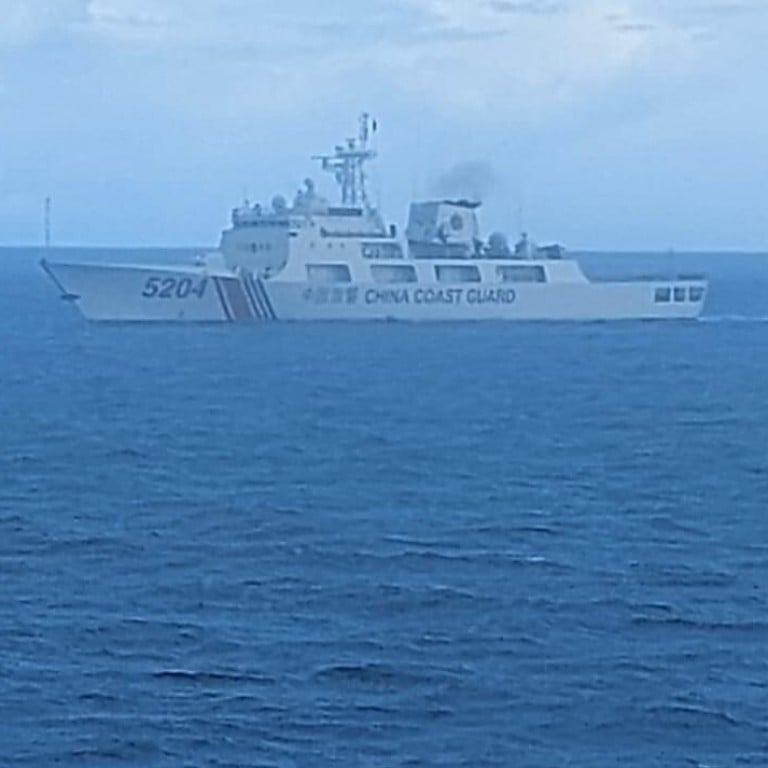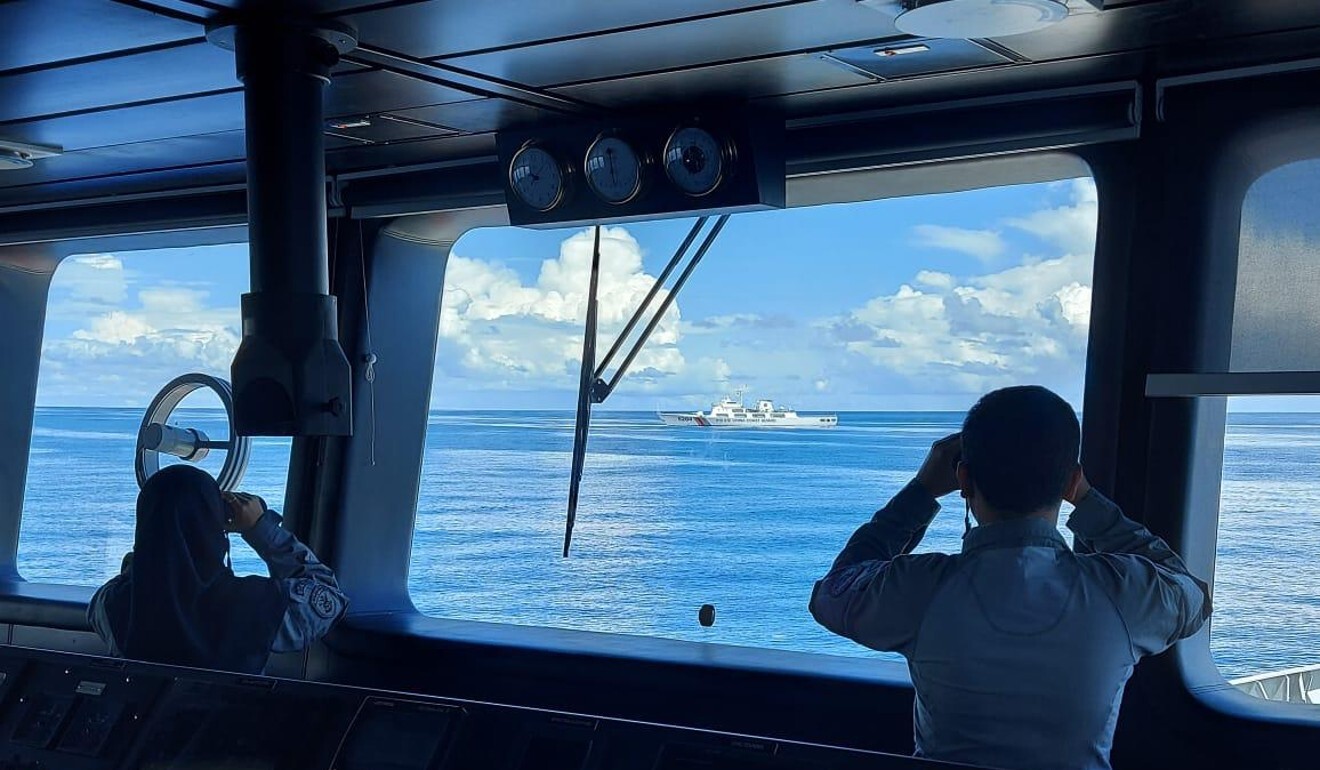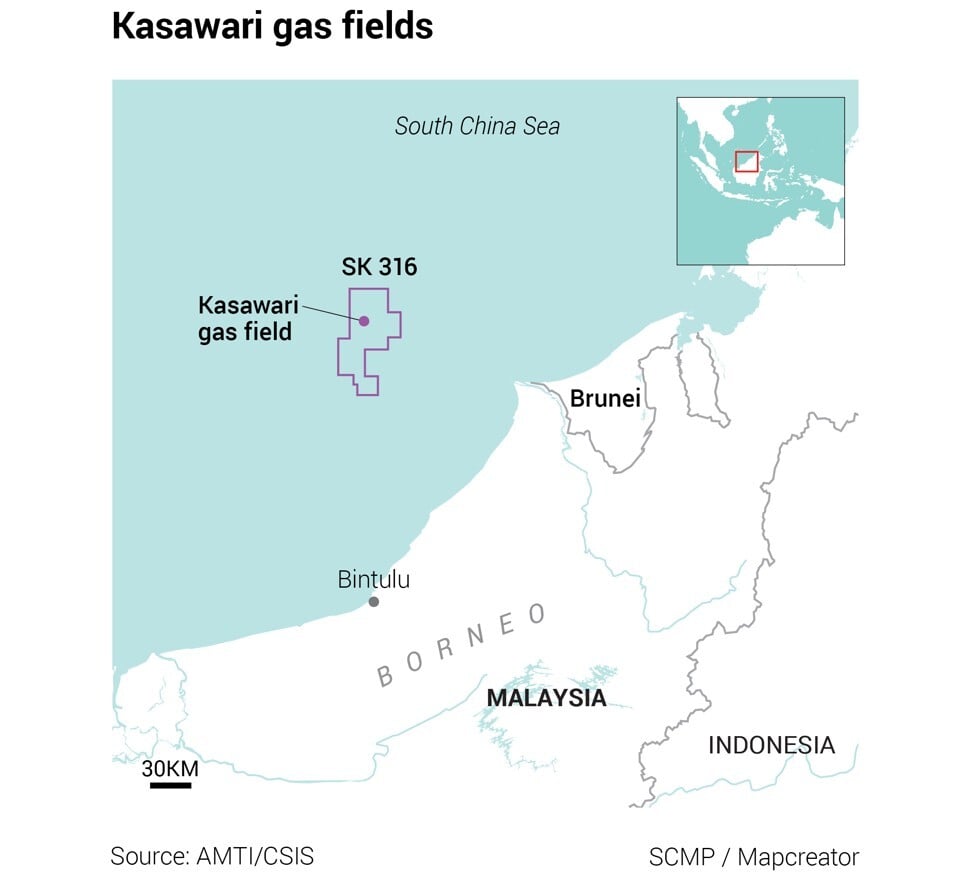
China harasses Malaysian oil and gas vessels on a ‘daily’ basis, Asia Maritime Transparency Initiative says
- Moves by Chinese coastguard and maritime militia said to be focused on Luconia Shoals, where Malaysia’s state-owned Petronas company is exploring a gas field
- Washington-based AMTI says civilian vessels there have been targeted daily for the past two years, and similar tactics now being used against Indonesian drillers in Natuna Sea
The Luconia Shoals, which lie within Malaysia’s exclusive economic zone, are home to the Kasawari gas field, which is being developed by Petronas and is situated some 200km (124 miles) from the coast of Bintulu in Sarawak.
Malaysia expects more Chinese boats in South China Sea as Petronas drills for oil
Last week, Malaysian Foreign Minister Saifuddin Abdullah said he expected more Chinese vessels to enter the country’s waters “for as long as” Petronas continued to develop the field, which was discovered in November 2011 and is thought to contain 3 trillion cubic feet (tcf) of recoverable gas resources. He also said Malaysia’s current relationship with China was “very difficult to quantify but is much better now”, despite what happened in the South China Sea.
Poling said, in an email response to questions from This Week in Asia, that the Chinese boats would harass offshore supply vessels servicing the rigs.
“They manoeuvre dangerously and intentionally create risks of collision to dissuade civilians from accepting such contracts,” Poling said.
Indonesia inching closer to Beijing, if South China Sea doesn’t ‘blow up’ ties
Beijing’s competing claimants to territory in the South China Sea have long accused it of using a paramilitary maritime militia, consisting of hundreds of civilian fishing boats, to help enforce its claims.
The richness of the Kasawari field – which Petronas CEO Tengku Muhammad Taufik Tengku Aziz has said is big enough to ensure his company remains one of the world’s top five exporters of liquefied natural gas – demonstrates how high the stakes in the South China Sea have become.

06:24
Explained: the history of China’s territorial disputes
Malaysia claims waters in the disputed South China Sea that extend 200 nautical miles from its coast. This includes an extended continental shelf claim it jointly submitted to the United Nations with Vietnam in 2009.
Malaysia also lays claim to 12 islands in the disputed Spratlys archipelago, and occupies five.
China rejects these assertions and instead lays claim to more than 85 per cent of the South China Sea. It marks the area it claims to have historic rights over with a nine-dash line on maps.
China’s envoy in Kuala Lumpur has been summoned twice this year by the Malaysian government in protest over Beijing’s activities in the South China Sea. The first came after Malaysia scrambled jets to intercept Chinese planes on an unannounced patrol that came close to violating the Southeast Asian country’s airspace. China said the “reported activities” were part of routine flight training that “do not target any country” and abided by international law.
Indonesian drilling harassed
Indonesia and China have often clashed in the past over fishing rights around the Natuna Islands, a region that borders the disputed South China Sea, though Indonesia does not consider itself a claimant state in the South China Sea disputes.
Poling said Chinese patrols in these waters were less regular than in Malaysian-claimed territory as there were no symbolically important reefs in the area.
However, this had changed in recent months and the Chinese coastguard was beginning to “harass Indonesian drilling in the Tuna Block in the same way it has harassed Malaysian and Vietnamese oil and gas operations for years,” he said.
Poling said that as at the Luconia Shoals, China had deployed a survey vessel in Indonesian waters to make life difficult for its drilling operations.
“In Indonesian waters, the Chinese coastguard generally deploys to protect large state-sanctioned fishing expeditions, as we saw in late 2019 and early 2020,” said Poling, referring to when a fleet of Chinese fishing vessels, backed by Chinese coastguard boats, entered the Natuna Sea and sparked a major confrontation with Indonesia.
“But so far we have not seen the militia used against Indonesia in the same way it has been against Malaysia and the other claimants,” he said.
Poling said that over the past four years or so China had become “increasingly bold” in harassing oil and gas operations and that its actions had been enabled by the completion of Chinese bases in the Spratly Islands, which acted as a launch pad for its naval, law enforcement and militia boats.
Malaysia expects more Chinese boats in South China Sea as Petronas drills for oil
He added that a nationalistic turn in China’s foreign policy following the emergence of the coronavirus had “supercharged” the situation.
A report by the Asia Maritime Transparency Initiative last month said China’s deployment of radar, combat aircraft and missile platforms to its outposts in the South China Sea had greatly expanded its ability to project power far from its own coast.
The report said China operated four large outposts with 10,000-foot runways in disputed areas of the South China Sea – at Woody Island, Fiery Cross Reef, Mischief Reef, and Subi Reef.
China had deployed substantial military assets to these islands, including HQ-9 anti-air and YJ-12B anti-ship missiles, sensing and communications facilities, and hangars capable of housing military transport, patrol, and combat aircraft, the report said.

Poling said that until now neither Malaysia nor Indonesia had tried to “publicise Chinese bad behaviour in the way that Vietnam and the Philippines do”, but this was beginning to change.
“Malaysia has become more vocal in the last two to three years, though it still avoids talking about most cases of Chinese harassment since there is little it can do to stop it,” Poling said.
However, he said that Indonesia had been “noticeably less vocal in recent months than it was the last time there was large-scale Chinese harassment in 2019-2020”.
A Chinese survey vessel, the Haiyang Dizhi 10, entered the North Natuna Sea near the Tuna Block area on August 31, left in late September, then returned in early October. Indonesia’s maritime security agency Bakamla said on Monday the vessel was “no longer there”.
China’s largest civilian patrol boat ‘could be used to back maritime claims’
Indonesia’s Coordinating Minister of Maritime and Investment Affairs Luhut Binsar Pandjaitan played down the presence of Chinese vessels in the Natuna sea, saying “we respect freedom of navigation in Natuna Sea” during a lecture at the Catholic University of America in Washington on October 18.
However, Bill Hayton, an associate fellow of the Asia-Pacific programme at London-based Chatham House and author of The South China Sea: The Struggle for Power in Asia, was derisive of Luhut’s comments.
“If Minister Luhut really thinks this is a case of ‘freedom of navigation’ then he should take advice from someone better qualified in the law of the sea,” Hayton said.
“If his government has not already sent a protest to Beijing then it needs to do so urgently or it will risk creating a precedent and losing its rights. Successive Indonesian governments have stuck their head in the sand when it comes to China’s behaviour near the Natuna Islands,” Hayton said.



